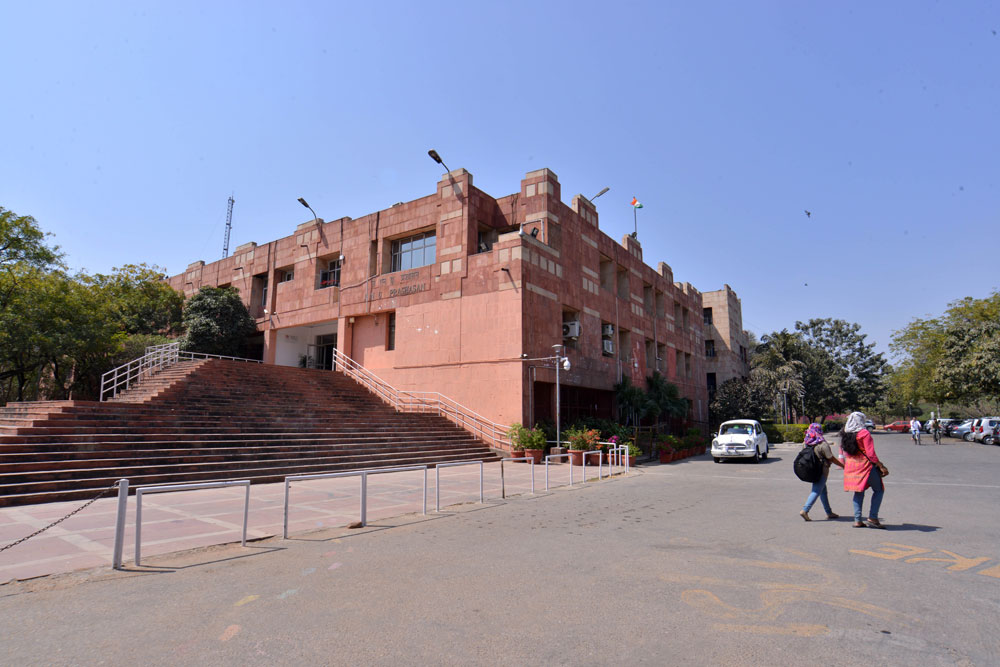Jawaharlal Nehru University has kicked off year-end semester examinations by sending question papers to students through email and asking them to submit answers through return mail or WhatsApp in an “alternative” — and rare — format aimed at dealing with the situation on the protest-hit campus.
Students of most schools and centres under the varsity have decided not to write the exam while academics and parents have dubbed the decision a “mockery” of the process of evaluation.
Vice-chancellor Prof. M. Jagadesh Kumar this week invoked special powers for adopting “alternative modes of examination”, allowing deans of schools and chairpersons of various centres to deal with the “extra-ordinary” situation, according to a circular issued on Thursday by an assistant registrar.
The campus has been in turmoil since varsity authorities recently announced a steep hike in hostel charges and introduced several new fees.
The varsity eventually decided to partially roll back the fee hike but the unrelenting students called for a boycott of the semester exams that were scheduled to begin from December 12.
Some of the schools have now gone ahead with the exams, mailing the question papers or sending them through WhatsApp. Among them was the School of Environmental Sciences, which emailed questions to students on Friday.
The questions followed an email that the dean, Prof. A.L. Ramanathan, wrote to master’s and MPhil students.
“As per the university circular regarding the alternate mode of examination this is to inform you all that the question papers of subjects will be sent to the respective students through e-mail today at 17.15 hrs,” Ramanathan wrote on Friday.
“You are advised to send your answers in respective papers either by scanning, hand-written and signed manuscript at the above mentioned e-mail ID on 23rd December 17.15 hrs.”
A student of the School of Environmental Sciences confirmed that he had received the questions. “But I have decided not to write the papers. This is not a valid examination,” the student said.
Prof. A.K. Mohapatra, the dean of the School of International Studies, also wrote to students saying they could submit answer scripts either through email, or images of handwritten copies through WhatsApp or personally to teachers by Saturday or latest by Sunday.
But the majority of the students are unlikely to take part in the exams.
Students and teachers of the various schools and centres said it was clear the majority of the students in most of the schools, including the School of Social Sciences, School of Language, School of Environmental Sciences and the School of Computer and System Sciences, had decided not to write and submit their answer scripts.
A Calcutta-based parent, an academic by profession, had written to vice-chancellor Kumar this week saying that degrees granted through assessment of answers sent by email or WhatsApp would lose value.
“As academic professionals we all understand how farcical such an examination would be,” he wrote.
“This kind of examination will surely tarnish the image of the number one university of the country, and devalue the degree my son hopes to earn from JNU.”
A student of the School of Environmental Sciences said many of his friends had forwarded questions to their friends in other institutions for help.
“There is no check and control. Students are doing all kinds of things starting from referring on-line answers to consulting teachers and friends in other institutions,” he said.
Prof. M.M. Salunkhe, who had headed a group set up by the University Grants Commission to study the examination systems in Indian universities and suggest improvements, said exams through email or WhatsApp would compromise their standard and end up victimising students.
Salunkhe said even exams on courses taught online or through distance education are conducted at specified centres under the supervision of invigilators. Open book exams too are conducted under supervision. “No supervision is like victimising the students.”
Prof. Rajeev Kumar, who teaches at JNU’s School of Computer and System Sciences, described the varsity’s decision as a “mockery” of the exam system.
Rajeev Kumar has written to the VC with a possible solution saying that students had already appeared for some tests in certain courses in September and October and the marks awarded from a portion of the courses could be extrapolated for all the courses and marks be granted. The administration has not yet responded.
The JNU teachers’ association on Friday met higher education secretary Amit Khare and sought the government’s intervention to stop exams through email and WhatsApp.
This newspaper sent an email to the VC; the rector, Prof. Chintamani Mahapatra; registrar Pramod Kumar and spokesperson Punam Kudesia to understand the university’s perspective on the concerns of students and parents.
Mahapatra said he would respond through email while Kudesia said she would forward the email to the officials concerned. No response had come in by the time this report was filed.

